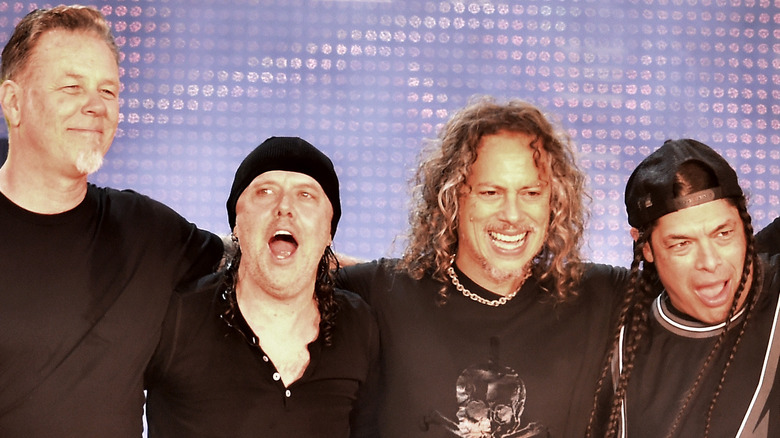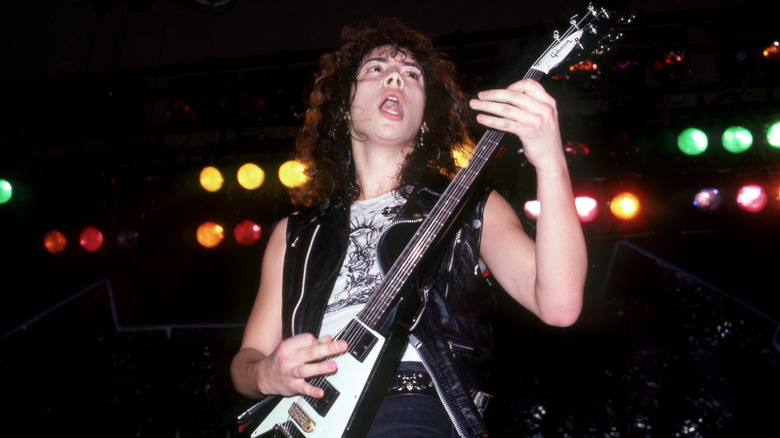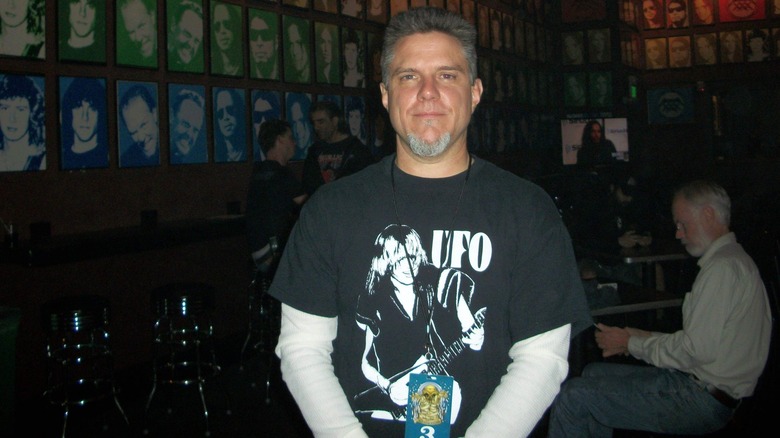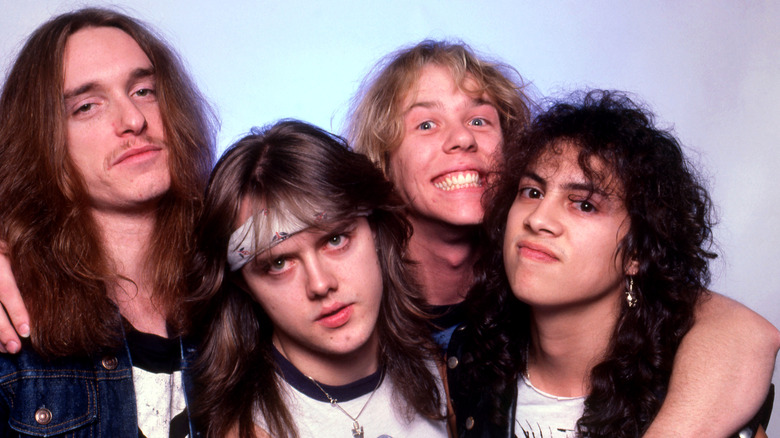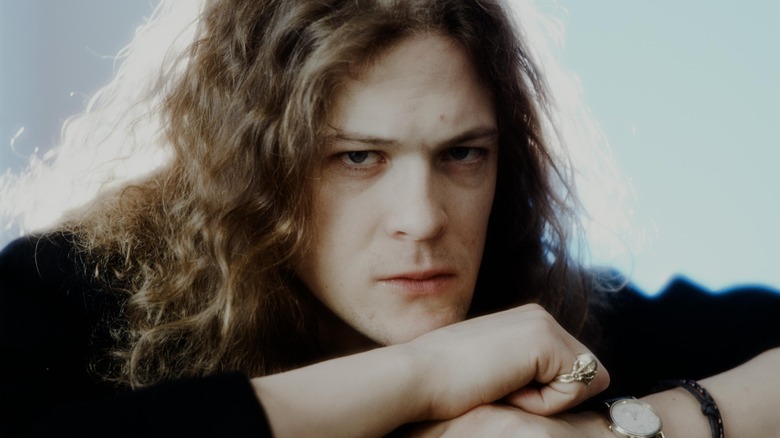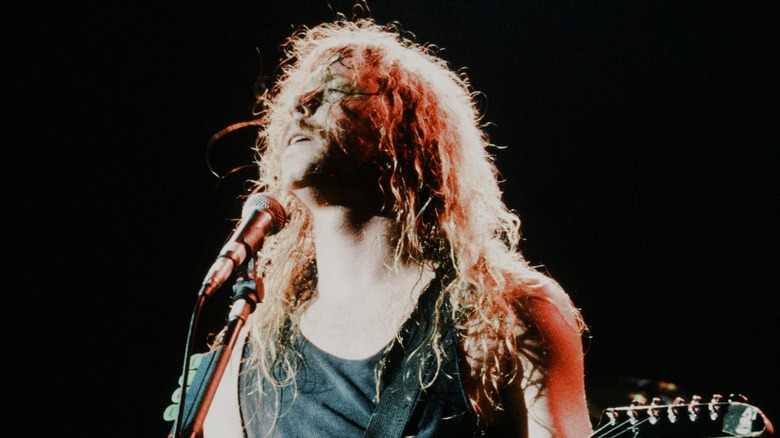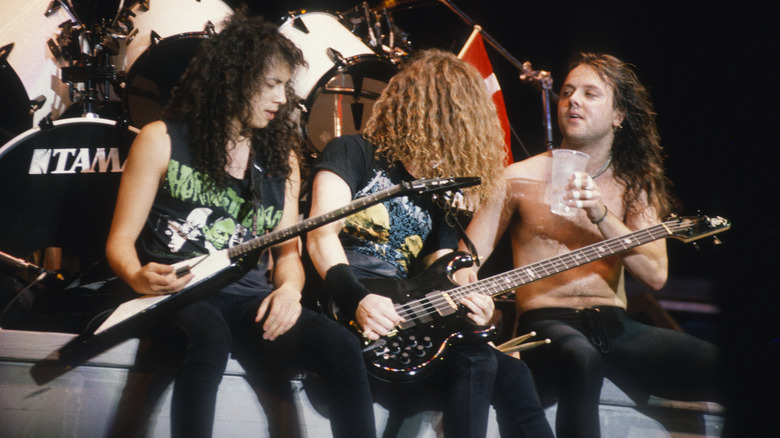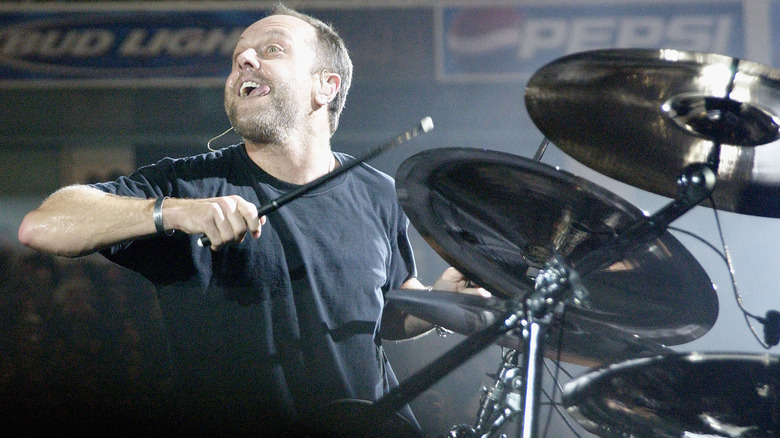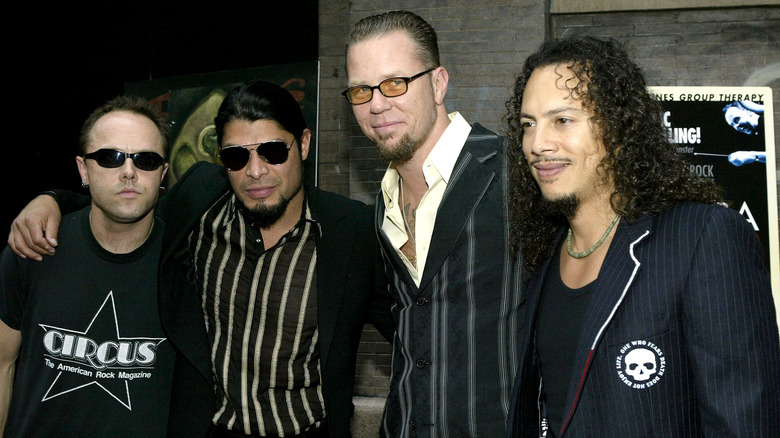The Tragic Real-Life Story Of Metallica
Thrash metal superstars Metallica have been tearing up stages around the world since 1981. In that time they've released some of the greatest albums in metal history, from 1984's "Ride the Lightning" to 1986's "Master of Puppets" and 1991's self-titled, hit-packed blockbuster known as "The Black Album." They've inspired almost every metal group that came after them and made millions of kids pick up guitars and turn to music as an outlet for their own problems.
But you don't devote your life to angry metal songs unless you've got some real pain and rage buried within. And singer-rhythm guitarist James Hetfield, drummer Lars Ulrich, lead guitarist Kirk Hammett, and whoever's on bass (currently Robert Trujillo) are no strangers to suffering. From broken homes, abusive childhoods, and the death of a bandmate to the scorn of fans, touring disasters, and addiction, this is the tragic real-life story of one of history's greatest metal bands.
James Hetfield's family didn't believe in medicine
Listen to just two or three Metallica songs, and you'll realize lead singer, rhythm guitarist, and lyricist James Hetfield is carrying a lot of pain and anger. He is a metal frontman, after all. (Not that we want anyone to suffer, but we doubt Metallica would be recognizable at all if its members had nothing to be angry about.) A lot of that comes from Hetfield's childhood, which was dominated by his parents' Christian Science worldview that denounced medicine.
"Our parents didn't take us to the doctor," Hetfield told Metal Hammer in 2020 (as excerpted by Loudersound). "We were basically relying on the spiritual power of the religion to heal us or to shield us from being sick or injured. And so at school I wasn't allowed to sit through health class, to learn about the body, to learn about illnesses and things like that." He continued, talking about how even trying out for his school's football team was a problem because his parents forbade him to get a physical.
Hetfield, fortunately, survived this upbringing, but his mother died after being diagnosed with cancer and refusing treatment (per the book "And Justice for All"). Hetfield sang about losing his mother in a number of songs. According to Rock Celebrities, "Mama Said" is about his relationship with her, and Songfacts reports "The God That Failed" is about how Cynthia Hetfield's religious beliefs failed to save her life.
Music helped Kirk Hammett survive an extremely dark childhood
"James comes from a broken home, and I come from a broken home, and when I joined the band, we kind of bonded over that," Metallica lead guitarist Kirk Hammett told Playboy in 2001, according to Scraps from the Loft. "I was abused as a child. My dad drank a lot. He beat the s*** out of me and my mom quite a bit."
It's tragically not too surprising, since you might not expect folks with healthy childhoods to make a living playing thrash metal. For Hammett, music wasn't just a hobby; it became a place of comfort and peace, even if he preferred material full of rage. Hammett went on to say that, once he got a guitar around the time he was 15 years old, he mostly stayed in his room. "I've definitely channeled a lot of anger into the music," he said.
Playing the guitar became Hammett's go-to method of releasing pain or calming himself down. "Basically, guitar playing and music saved my life," Hammett said on the podcast "Backstaged: The Devil in Metal" (per Vermilion County First). "It was a type of therapy for me. It made me feel better when I knew that I wasn't feeling great." It's a habit he's maintained over the years. "I'm prone to depression like most people," he continued. "My guitar helps me through all that."
If you or someone you know is dealing with domestic abuse, you can call the National Domestic Violence Hotline at 1−800−799−7233. You can also find more information, resources, and support at their website.
A former bassist quit the music scene after leaving the band
Starting a band with friends is the ultimate dream. What could possibly be better than rocking out with close pals onstage? For Ron McGovney, that's how it all started. Having met in middle school, McGovney and James Hetfield jammed together in their teenage years. Later on, Hetfield met Lars Ulrich, and the pair started Metallica. Eventually, McGovney joined the heavy metal group as their bassist.
McGovney played shows with Metallica and even recorded a four-track demo. Tensions started to mount between the bassist and the rest of the band in 1982, with him suspecting they were looking at Cliff Burton to replace him. After hearing how Dave Mustaine had reportedly poured beer over his bass one day, McGovney claimed he kicked the band out of his home, bringing a close to his time in Metallica.
Speaking to Shockwaves, McGovney revealed the event left a sour taste in his mouth and he quit music. "I was so disgusted with the whole thing that I sold all my equipment: my amps, my cases, I even sold my Les Paul which would now be worth about $1,200," he said. "I was just so pissed with the whole thing." McGovney stayed away from the music scene for four years, until another friend convinced him to join Phantasm. His return was short-lived, though; McGovney quickly grew tired of fans attending the band's shows just because he'd been in Metallica, and he left the music business altogether.
Dave Mustaine was fired from Metallica and held a grudge for years
Everyone in Metallica drank, leading them to nickname themselves "Alcoholica." But Loudwire reports that original lead guitarist Dave Mustaine was in a league of his own when it came to knocking back a bottle. He admits it, saying he was a "violent alcoholic" and stating, "I lost all inhibitions when I was drinking, and that didn't go over too well in the end." In his 2011 autobiography, Mustaine details a particularly nasty fistfight with bandmates Hetfield and original bassist Ron McGovney that irreparably soured his relationship with the group. He was temporarily fired, but his return was short-lived.
According to the Loudwire article, in spring 1983, James Hetfield, drummer Lars Ulrich, and bassist Cliff Burton handed Mustaine a bus ticket and kicked him out of the group without warning, ultimately replacing him with current axeman Kirk Hammett. But Mustaine didn't take the rejection lying down. Metal Insider reports the fiery-haired and even more fiery-tempered rocker funneled his rage into a new band: fellow "Big Four" thrash outfit Megadeth, which has sold upward of 50 million albums all on their own (per Warner Music Group).
But despite his more-than-respectable success, Mustaine remained hurt over his firing for years, especially since Metallica has proven to be considerably more popular than his band. You can see a very unmetal therapy session between Mustaine and Ulrich on YouTube, as part of Metallica's "Some Kind of Monster" documentary.
If you or anyone you know is struggling with addiction issues, help is available. Visit the Substance Abuse and Mental Health Services Administration website or contact SAMHSA's National Helpline at 1-800-662-HELP (4357).
Cliff Burton died in a tour bus crash
It's 1986, and Metallica, flying high off the success of their still-legendary third album, "Master of Puppets," were out on tour. Sadly, not all of them would survive it.
Ultimate Classic Rock reports that on September 26, the group was asleep on their bus in Sweden when the vehicle slipped on black ice and crashed violently. Almost everyone made it out alive. But 24-year-old bassist Cliff Burton, who had defeated Hammett in a card-drawing competition and therefor got to sleep in the top bunk, was thrown through the window and trapped under the bus when it fell over. Whether he died on impact or when the bus fell on top of him a second time, during an unsuccessful rescue attempt, is up for debate. There have also been questions about whether the bus driver fabricated the black-ice story to cover up alcohol impairment or falling asleep at the wheel, but he was ultimately cleared of wrongdoing.
The loss was devastating for Metallica, and the whole metal community mourned. Former guitarist Dave Mustaine, who hated the band at the time for firing him, wrote "In My Darkest Hour" after hearing the news, while fellow Big Four thrashers Anthrax dedicated their most popular record, "Among the Living," to the bassist's memory. Unsurprisingly, the loss still hurts for Burton's former bandmates, who detailed the tragedy to Hammer. "Coming out and finding your buddy under the bus is not something you want to go through," Hetfield remarked, per Loudersound. "Our first reaction was anger –- one of the things we were good at."
Jason Newsted was ruthlessly hazed
Bassist Cliff Burton's death put the band in a difficult position. Not only were they devastated at the loss of a friend, but they had to figure out how to soldier on as a band. They auditioned replacements and ultimately tapped bassist Jason Newsted for the position, per Hauraki. Joining one of the most respected metal groups of the day was a dream come true for Newsted, but it wasn't a cakewalk. Getting hired was one thing. Getting fully accepted was another matter entirely.
Newsted ultimately endured hazing that would've made the worst college frats blush. The Hauraki article reports that Newsted's new bandmates even turned down his bass to nearly inaudible levels on 1988's "...And Justice for All." He eventually earned their respect by taking it on the chin and reliably doing his job. But it was rough going for a while. And although some of the abuse was just the kind of "messing with the new guy" shenanigans you'd expect bored 20-somethings to indulge in, a lot of it came from a darker place.
"[We] took a lot of our resentment, a lot of our grief, a lot of our despair around Cliff's death out on Jason," Hetfield later admitted, according to Ultimate Classic Rock. "Right from the beginning there was a lot of hazing that just separated him, and he was always thought of as 'the new guy.' I wish that that didn't have to happen. ... We were brutal with him."
Metallica lost a best metal performance Grammy... to Jethro Tull
Ultimate Classic Rock reports that in order to prove they weren't out of touch, the National Academy of Recording Arts and Sciences introduced the Grammy for Best Hard Rock/Metal Performance in 1989. Jane's Addiction, AC/DC, and Iggy Pop were among the contenders, but Metallica was the favorite to win. The previous year's "...And Justice for All," spearheaded by the hit single "One," had been yet another leap forward not just for the band, but for heavy music as a whole. But none of those bands won. Proving once and for all that the Academy was indeed out of touch, the award went to the fifth nominated artist: Jethro Tull.
"Everybody in that room was certain that Metallica would get the Grammy," Alice Cooper, who presented the award alongside Lita Ford, later commented, according to Classic Rock (excerpted in Loudersound). "There was a two-minute pause, then everybody broke out laughing. They thought I was doing a joke." According to the article, Jethro Tull wasn't even present; they were considered such long shots that their record label, Chrysalis, didn't think they should bother to attend the event.
Meanwhile, Metallica's label, Elektra Records, was left holding the bag after the mystifying ceremony. "The record company had already made 10,000 one-sheets to put in record stores that said 'Grammy Award Winner,'" drummer Lars Ulrich later said to Rolling Stone. "So we said, why don't we just put a sticker on them that says, 'Grammy Award Loser'?"
Metallica's joint tour with Guns N' Roses was a disaster
Billboard reports that Nirvana, Pearl Jam, Tupac, N.W.A., U2, the Red Hot Chili Peppers, and other artists put out landmark hits in 1991. But the two biggest rock titans at the time were undoubtedly Metallica, who released the self-titled record known as "The Black Album," spearheaded by hits "Enter Sandman" and "Nothing Else Matters," and Guns N' Roses, who put forth "Use Your Illusion I & II" in September to enormous fanfare.
According to Ultimate Classic Rock, the two bands decided to join forces for a brief 1992 stint in North America. It made sense on paper for two of the biggest bands on earth to share a bill, but the partnership was fraught with drama and controversy, largely due to the antics of Guns N' Roses frontman Axl Rose. On one fateful night in Montreal, it all fell apart. During the opening notes of "Fade to Black," James Hetfield accidentally wandered into the path of a pyrotechnic blast and had to be rushed to the hospital with second- and third-degree burns. Guns N' Roses agreed to take the stage early to appease a restless crowd, but then Rose stormed offstage halfway through the show, complaining about sound issues.
The crowd lost it. The ensuing riot spilled into the streets, where fires were set and cars were overturned. At least three police officers and 10 rioters were reportedly injured. "I go and light myself on fire," Hetfield later remarked on VH1's "Behind the Music," "and he upstages me."
The band struggled after 1991's self titled Black Album
Metallica's 1983 debut, "Kill 'Em All," is considered to be the birth of thrash metal, per Loudwire. Classic Rock History reports the following year's "Ride the Lightning," with hits like "For Whom the Bell Tolls" and "Creeping Death," was a huge leap forward for the group. Loudersound isn't alone in calling 1986's "Master of Puppets" the greatest metal album of all time. Kerrang details how 1988's "...And Justice for All" pushed the whole genre forward, and The Wall Street Journal has receipts on how their 1991 self-titled "Black Album" became a landmark, blockbuster smash hit not just for the band, but for heavy metal as a whole. Throughout the '80s and early '90s, it seemed like Metallica, flying the metal flag high enough for the world to see, could do no wrong.
Then it all came to an end, at least for a time. Pitchfork details the creative and popular slump that seized the once-beloved band in the mid-'90s. Metallica proved they had no place to go but down by going down with 1996's "Load" and 1997's "Reload." Then the band sued Napster for allowing people to pirate their music. They had a point, but to fans, this firmly proved they'd become the very thing they swore to destroy: the establishment.
Then in 2003, they hit their lowest point yet: the release of the much-maligned "St. Anger," which the article calls "laughably bad."
Metallica aired its dirty laundry in Some Kind of Monster
In the early 2000s, Metallica hit another rough patch. Not only had they not put out a beloved record in more than a decade, but tensions within the group were at an all-time high. The 2004 documentary "Metallica: Some Kind of Monster" goes into all of this.
As detailed in the movie, the band was already reeling from fan backlash to the Napster lawsuit when James Hetfield entered a rehab clinic to deal with heavy alcohol use. Then, Jason Newsted, who'd played bass with the band since 1986 and long since shed the "new guy" stigma, left the band. (According to Loudwire, he cited Hetfield's disapproval of his side project, Echobrain, as his reason for leaving.) The group tapped Suicidal Tendencies bassist Robert Trujillo to replace Newsted, but the problems continued. The film documents numerous backstage fights showing a band pushed to the edge, including one where Hetfield storms out of the room after getting into it with Ulrich. Throughout it all, Kirk Hammett is something of a peacekeeper, but there are moments where he openly laments the exclusion of guitar solos in their then-upcoming album "St. Anger" (which ended up being their least popular record).
It might not seem particularly metal to air your grievances so publicly, but the movie was well-received, with the Rotten Tomatoes critics consensus calling it a "fascinating behind-the-scenes look at how Metallica survives one of their more turbulent periods."
Band members have dealt with addictions
The members of Metallica were never known for hard drug use like Ozzy Osbourne and members of Aerosmith, Mötley Crüe, or Guns N' Roses, but that doesn't mean they were strangers to unhealthy substance use and addiction. James Hetfield had already been to rehab for alcohol misuse once, as shown in 2004's "Metallica: Some Kind of Monster." In 2019, a message on the band's website (as detailed in Rolling Stone) read, "As most of you probably know, our brother James has been struggling with addiction on and off for many years. He has now, unfortunately, had to re-enter a treatment program to work on his recovery again." Fortunately, Hetfield has recovered, and Blabbermouth reports that Lars Ulrich thinks the band is in "a very healthy place" as of 2020.
But Hetfield wasn't alone. Guitarist Kirk Hammett was reportedly a heavy drinker as well. According to Female First (summarizing an interview with Kerrang), Hammett said he would "go out after a show and carry on all night. I'd go back to the hotel room and play guitar for two or three hours and not remember anything the next day. ... I stopped drinking and now I go back to my room and play guitar and remember everything!"
The article also reports that Hammett used cocaine for years, but ultimately beat it in an unconventional way: by spending huge amounts of money on comic books to get his mind off things.
If you or anyone you know is struggling with addiction issues, help is available. Visit the Substance Abuse and Mental Health Services Administration website or contact SAMHSA's National Helpline at 1-800-662-HELP (4357).
James Hetfield publicly announced he feels he's too old to play anymore
Metallica are now respected elder statesmen of rock and metal. They're revered by countless up-and-comers and millions of fans around the world thanks to multiple game-changing albums and some of the most instantly recognizable hits in metal history, from "Sad but True" and "Seek and Destroy" to "Master of Puppets" and "Battery." They've dealt with addictions, loss, fan backlash, and internal conflict, and somehow came out the other side as the same old Metallica fans have loved for decades.
But all that hard living has taken its toll, and none of the four (or any surviving previous members) are spring chickens anymore. According to Loudersound, James Hetfield became emotional at a May 2022 show in Brazil, telling the audience that he fears his age has caught up to him. "I've gotta tell you I wasn't feeling very good before I came out here," he said to the crowd. "Feeling a bit insecure, like I'm an old guy, can't play anymore. All this bull**** that I tell myself in my head. So I talked to these guys, and they helped me — as simple as that. They gave me a hug and said, 'Hey, if you're struggling onstage, we've got your back.' And I tell you, it means the world to me."
This prompted his bandmates, likely no strangers to similar feelings themselves, to run up and embrace him. "And seeing you out there," Hetfield continued through tears, "I... I am not alone. I am not alone, and neither are you."
